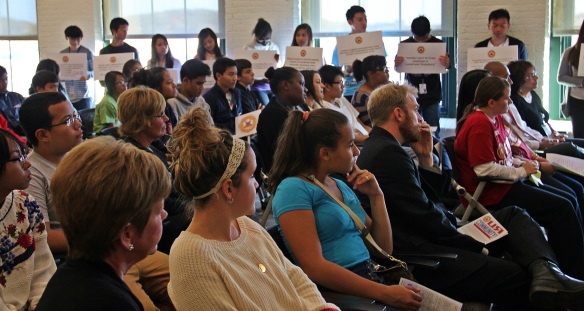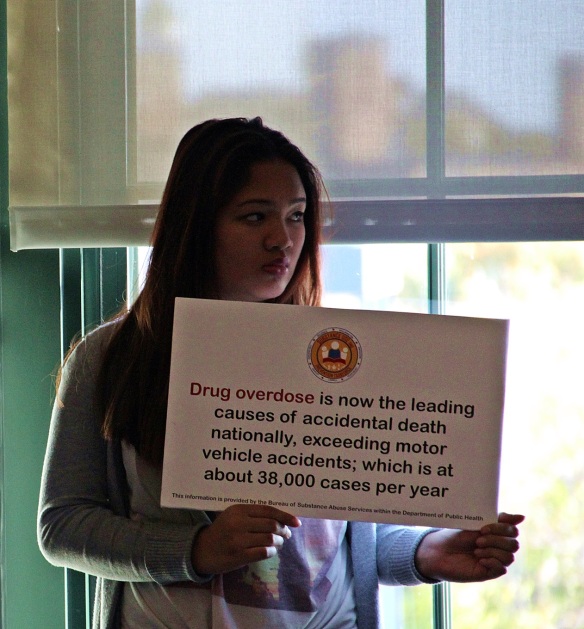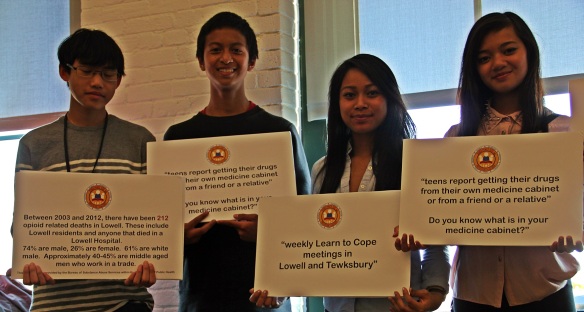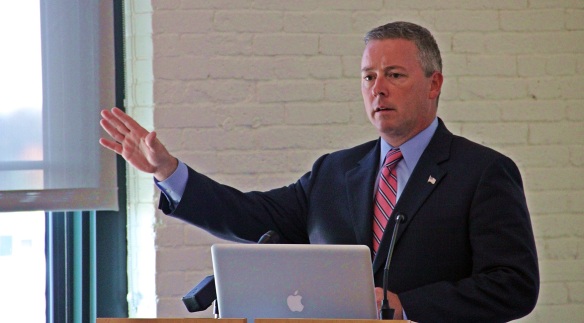Robert Gignac has known her nearly his entire life. They went to the same elementary and middle schools, played at the same parks, walked the same streets, knew the same people.
She attended Greater Lowell Technical High School and landed a job right after graduation. Then she began experimenting with prescription drugs.
“That immediately took its toll on her,” Gignac told a room full of young people at Monday’s Opiate Awareness Week event at the Lowell Community Health Center.
When the pills became more than she could afford, Gignac’s friend turned to the cheap alternative — heroin. She lost her job; her child was removed from her custody.
Yesterday she celebrated her birthday behind bars at Framingham State Prison; her incarceration the result of the crimes she committed in the never-ending quest to feed her habit.
The people who become addicted to prescription painkillers and move on to harder narcotics are not the stereotypical “junkies.”
They are student athletes who blow out their knees, they are mothers who have had dental work, they are carpenters and roofers injured on the job, they are teens who try the pills found in their grandmother’s medicine cabinet.
According to the Lowell Health Department, there were 212 opiate-related deaths in Lowell (both Lowell residents and those who died at Lowell hospitals) from 2003-2012. Of those who died, 74 percent were male, 26 percent female; 61 percent were white males; 40-45 percent were middle-aged tradesmen.
“These pills can change your life and it’s not for the better,” Gignac said. “If you are not prescribed it, you shouldn’t be taking it.”
Interim Lowell Police Superintendent Deb Friedl warned that people often have no idea what they are putting in their bodies when they consume pills.
Often, drug dealers will manufacture pills themselves in drug labs rather than pursuing the more expensive and difficult avenue of trying to score drugs manufactured in pharmaceutical labs for legitimate purposes.
“Those pills are comprised of heaven knows what,” she said. “We don’t even know what they are putting in the pills.”
Friedl said a significant amount of the crime in the city is directly attributable to drug addiction, a scourge the police have seen take control of victims at younger ages than ever.
“We cannot arrest our way out of this,” Friedl added, saying beating back addiction begins with education, by reaching out to young people and making them understand the dangers.
Linda Sou, Director of the Lowell Community Health Center Teen Block and Co-Chair of the Substance Use and Prevention Task Force presented a video made by Sochenda Uch, also of the LCHC, highlighting the work, in conjunction with a coalition of community leaders and organizations, that has been done and is continuing to educate the community about the dangers of drugs and how to combat them.
Learn to Cope is now holding support group meetings in Lowell and Tewksbury.
Kiosks have been placed in the lobbies of police stations throughout Greater Lowell at which people can dispose of unwanted/unneeded medications.
There is current a movement underway to develop a curriculum for grades 3-12, integrating age-appropriate substance abuse education into the school day.
Like Gignac, State Rep. Tom Golden, who has been fighting for increased drug rehabilitation treatment and tighter regulations on prescription drugs on Beacon Hill for years, has known people personally touched by the ravages of addiction.
Nine years ago a friend called him about some trouble his nephew was in, “that trouble is something nobody wants to talk about,” Golden said.
Golden was able to help get the young man into a detox facility. Three days after being released, he died.
He came from a family with resources, who had the ability to make a call to get their son help, but it just wasn’t enough.
Golden said he is proud of the way the city of Lowell “has always taken this on head-on,” telling the young people in attendance they are in a position to make a difference moving forward and that “your community is with you every step of the way.”
“We as a community need to continue to say ‘No,’” Golden said.
City Manager Bernie Lynch said it gave him hope to see so many young people involved and interested in battling the problem of drug addiction in their city.
 Lynch stressed opiate abuse is not just a city problem, but also a “monumental” problem in the suburbs that is too often not spoken about.
Lynch stressed opiate abuse is not just a city problem, but also a “monumental” problem in the suburbs that is too often not spoken about.
“I’m very proud here in the city of Lowell we haven’t swept it under the rug,” he said.

 The Substance Use and Prevention Task Force is part of the Greater Lowell Health Alliance of the Community Health Network Area 10. GLHA is a nonprofit organization comprised of public, non-profit and private sectors working together to build healthier communities through community-based prevention planning and health promotion. The Substance Use and Prevention Task Force is one of five task forces focused on identified areas of need, including Mental Health, Healthy Eating and Living, Cultural Competency, and Maternal/Child Health issues.
The Substance Use and Prevention Task Force is part of the Greater Lowell Health Alliance of the Community Health Network Area 10. GLHA is a nonprofit organization comprised of public, non-profit and private sectors working together to build healthier communities through community-based prevention planning and health promotion. The Substance Use and Prevention Task Force is one of five task forces focused on identified areas of need, including Mental Health, Healthy Eating and Living, Cultural Competency, and Maternal/Child Health issues.
You can learn more at http://www.greaterlowellhealthalliance.org.








Congratulations to all on addressing such an important topic in our community.
The Substance Use and Prevention Task Force is part of the Greater Lowell Health Alliance of the Community Health Network Area 10. GLHA is a nonprofit organization comprised of public, non-profit and private sectors working together to build healthier communities through community-based prevention planning and health promotion. The Substance Use and Prevention Task Force is one of five task forces focused on identified areas of need, including Mental Health, Healthy Eating and Living, Cultural Competency, and Maternal/Child Health issues.
You can learn more at http://www.greaterlowellhealthalliance.org.
Pingback: Opiate Abuse Awareness | richardhowe.com